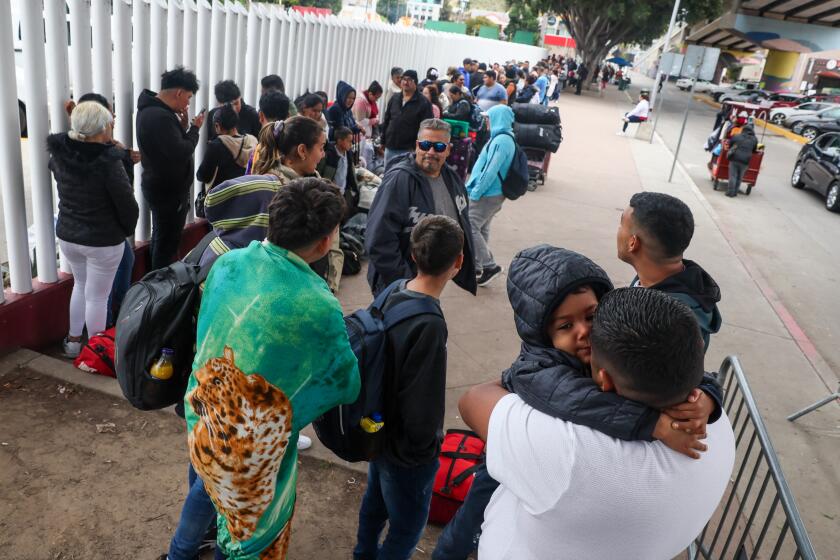Clinton Says He’d Cancel Order on Haitians’ Return : Immigration: Incoming President asserts all refugees are entitled to a hearing. But influx would swamp U.S. screening and housing facilities.
Boats are under construction up and down the coastline of Haiti, ready to carry a new outpouring of refugees--perhaps several hundred thousand of them--from the impoverished island to a hoped-for asylum in the United States.
If all those wanting to leave actually put out to sea, President-elect Bill Clinton could be faced with a major foreign policy dilemma. At the very least, such an influx would swamp the U.S. government’s facilities for screening and housing refugees.
At his first post-election press conference, Clinton said that he will rescind an executive order issued in May by President Bush that requires the Coast Guard to return to Port-au-Prince all Haitians picked up at sea. He said that refugees are entitled to a hearing to determine whether they are eligible for asylum. But he conceded that he has not decided where and under what circumstances those hearings would occur.
“I think that we should have a process in which these Haitians get a chance to make their case,” Clinton said. “I think that . . . sending them back to Haiti under the circumstances which have prevailed (on the island) for the last year was an error.
“I am not in a position now to tell you exactly how we’re going to do it or what the specifics will be but I can tell you I’m going to change the policy,” he said.
In Haiti, the potential refugees are ready to respond to Clinton’s new policy, whatever it turns out to be.
Tom Wenski, a Creole-speaking priest at Notre Dame d’Haiti in Miami said: “Basically, everybody’s saying if things don’t improve over there there’s going to be no other choice but to leave. The bottom line is, things are not going to improve unless the elected President, Jean-Bertrand Aristide, is returned.
“I know from priests traveling back and forth to Haiti that there are boats being built all over the coastline,” Wenski said. “Now through November, the end of the hurricane season, is a good time to sail.”
The most recent exodus of Haitians began in September, 1991, after a military coup ousted Aristide, the country’s first popularly elected president. Before Bush sought to stem the flow with his May executive order, about 40,000 persons had been picked up at sea by a line of Coast Guard cutters cruising just outside Haiti’s territorial waters.
U.S. officials have speculated that at least another 40,000 Haitians may have drowned when their overcrowded boats capsized. That number has never been confirmed, however.
From September to May, the Coast Guard delivered the Haitians to a tent city on the U.S. Navy base at Guantanamo Bay, Cuba, where they were interviewed by U.S. immigration officials. Under U.S. law and international practice, persons fleeing political persecution are entitled to asylum but persons trying to escape poverty are not. About one-fourth of those interviewed at Guantanamo Bay were determined to have made a good enough case that they were sent to the United States for further screening.
Clinton said that the distinction between political and economic refugees is a “legitimate” one that he would not try to change.
Experts in refugee policy said that Clinton apparently has only three options: bringing the Haitians to the United States for screening; reopening the Guantanamo Bay facility or interviewing the potential refugees at sea aboard the Coast Guard cutters.
Doris M. Meissner, a former acting U.S. immigration commissioner, said it would be a mistake to allow Haitians to reach the U.S. mainland before they have established their right to asylum because that would encourage more people to try to leave the island.
Meissner, now a scholar at the Carnegie Endowment for International Peace in Washington, said that Clinton’s best option probably would be to reopen the Guantanamo facility.
More to Read
Start your day right
Sign up for Essential California for news, features and recommendations from the L.A. Times and beyond in your inbox six days a week.
You may occasionally receive promotional content from the Los Angeles Times.






